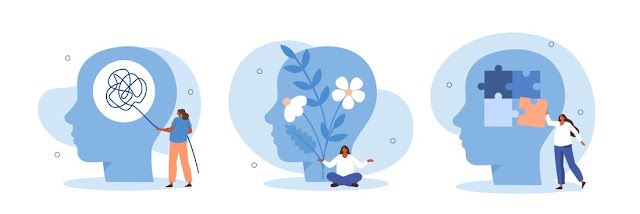Nurturing Mental Health in Relationships: The Power of Understanding and Support

Mental health and relationships form a complex and symbiotic
interplay, each profoundly impacting the other. The way we nurture our mental
health significantly influences the quality of our relationships, while the
nature of our relationships deeply affects our mental well-being. Understanding
this relationship is fundamental to fostering healthy, supportive connections
that promote overall well-being
The Influence of Mental Health on Relationships:
Mental health serves as the bedrock upon which our relationships
are built. Our ability to communicate effectively, express emotions, and
provide support within relationships is heavily influenced by our mental
well-being. For example, someone grappling with depression might find it
challenging to engage in meaningful conversations or offer emotional support to
their partner, affecting the relationship dynamics.
The Impact of Relationships on Mental Health:
Conversely, the nature of our relationships significantly
impacts our mental health. A nurturing, supportive relationship can act as a
shield against mental health issues. However, toxic, or strained relationships
can exacerbate existing mental health conditions or even lead to their
development. For instance, being in a controlling or emotionally abusive relationship
can contribute to anxiety, depression, or trauma.

Examples of Mental Health and Relationships:
Supportive Relationships: In a healthy relationship,
partners provide crucial support for each other's mental health. For example, a
partner dealing with anxiety might find solace in a supportive companion who
actively listens and offers reassurance during distressing times. Such support
can be a cornerstone in managing mental health challenges.
Communication Dynamics: Effective communication is
pivotal in maintaining mental health within relationships. A couple engaging in
open, honest conversations about their mental health can create an environment
of understanding and empathy, fostering a stronger connection and better mental
well-being.
Toxic Relationships: Toxic relationships can severely
impact mental health. Emotional manipulation, constant criticism, or lack of
empathy can lead to various mental health issues. Seeking professional help or
exiting such relationships is crucial for preserving mental well-being.
Family Dynamics: Family relationships also
significantly impact mental health. Children raised in a supportive, nurturing
environment tend to develop healthier coping mechanisms and emotional
regulation skills. Conversely, adverse childhood experiences like neglect or
abuse can lead to mental health challenges in adulthood.

Strategies for Nurturing Mental Health in Relationships:
Open Communication: Encourage open and honest
conversations about mental health within the relationship.
Empathy and Understanding: Practice empathy and
actively seek to understand each other's experiences and emotions without
judgment.
Seeking Professional Help: It's important to
encourage seeking professional help, be it individual therapy, couples
counseling, or family therapy when needed.
Prioritizing Self-Care and Respect for Boundaries:
Encouraging self-care practices is essential for both
partners in a relationship. It involves setting aside time for personal
hobbies, relaxation, or activities that promote mental and emotional
well-being. Additionally, respecting each other's boundaries ensures a healthy
balance between togetherness and individual space, thereby fostering a stronger
relationship.

Nuances in Mental Health and Relationships:
The Ripple Effect of Mental Health: The mental health
of one partner in a relationship can greatly impact the other. For instance, a
partner struggling with anxiety might unintentionally project their stress onto
their significant other, affecting the overall relationship dynamic.
Long-Term Impact of Supportive Relationships: Studies
suggest that individuals in supportive, nurturing relationships tend to have
better mental health outcomes. Having a reliable support system can mitigate
the impact of stressors and aid in coping with mental health challenges.
Challenges in Seeking Help: There might be resistance
or hesitancy in seeking professional help due to stigma or fear of judgment.
It's important to break these barriers and encourage an environment where
seeking help is normalized and perceived as a proactive step toward mental
wellness.

The Long-Term Implications:
Investing in mental health within relationships can yield
profound, long-term benefits
Resilience: A relationship that nurtures mental
health and serves as a strong buffer against life's adversities, fostering
resilience and a sense of security.
Emotional Intimacy: Partners who support each other's
mental health tend to develop deeper emotional connections and intimacy,
enhancing the quality of the relationship.
Improved Problem-Solving: A mentally healthy
relationship often exhibits improved problem-solving skills. Partners can
navigate challenges more effectively and collaboratively.
Conclusion:
Nurturing mental health within relationships is an ongoing
journey that requires understanding, support, and continuous effort from all
involved. By recognizing the profound influence of mental health on
relationships and vice versa, individuals can foster healthier, more resilient
connections that support and elevate each other's well-being. Communication,
empathy, and seeking professional help when necessary are pivotal in nurturing
a relationship that prioritizes mental health and overall wellness.



Comments
Post a Comment